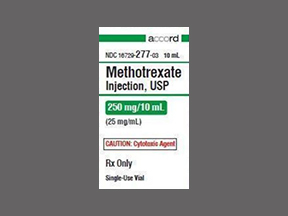
Methotrexate Sodium (pf) Coupons & Savings Card – Discount Prices from $3.68
Methotrexate is prescribed for the treatment of specific cancers, severe psoriasis, and rheumatoid arthritis. It is also used for polyarticular juvenile idiopathic arthritis (pJIA) in children. As an antimetabolite, methotrexate functions by inhibiting the growth of cancer cells and preventing the immune system from damaging healthy tissues. In rheumatoid arthritis, early intervention with methotrexate can help minimize joint damage and maintain joint functionality.
Our coupons are free to use. Before paying, show the pharmacist your Methotrexate Sodium (pf) savings card to get your free discount. Use our filters below to edit the prescription box to match your needs. The Methotrexate Sodium (pf) prices will update based on your prescription needs. Above our Methotrexate Sodium (pf) coupons, you can change your location to see pharmacy prices and costs in other areas. We're here to help you buy Methotrexate Sodium (pf) at the lowest price with our prescription discount card.
My prescription
Edit
10ML of 250MG/10ML, Methotrexate Sodium (pf) (1 Vial)
Select pharmacy

CVS
$24.42
COUPON PRICE
Walmart
$3.68
COUPON PRICE
Albertsons
$9.51
COUPON PRICE
Walgreens
$17.69
COUPON PRICEMethotrexate Sodium (pf) savings card
Show this card to your pharmacist
Walmart
$3.68
BIN
ID
PCN
GRP
019876
LH51234DEC
CHIPPO
LHX
Powered by
Methotrexate is prescribed for the treatment of specific cancers, severe psoriasis, and rheumatoid arthritis. It is also used for polyarticular juvenile idiopathic arthritis (pJIA) in children. As an antimetabolite, methotrexate functions by inhibiting the growth of cancer cells and preventing the immune system from damaging healthy tissues. In rheumatoid arthritis, early intervention with methotrexate can help minimize joint damage and maintain joint functionality.
Our coupons are free to use. Before paying, show the pharmacist your Methotrexate Sodium (pf) savings card to get your free discount. Use our filters below to edit the prescription box to match your needs. The Methotrexate Sodium (pf) prices will update based on your prescription needs. Above our Methotrexate Sodium (pf) coupons, you can change your location to see pharmacy prices and costs in other areas. We're here to help you buy Methotrexate Sodium (pf) at the lowest price with our prescription discount card.
Methotrexate Sodium (pf) dosage forms
Use our Methotrexate Sodium (pf) 2ML of 50MG/2ML coupon with prices from $5.20 for 1 Vial. You can also use our Methotrexate Sodium (pf) 2ML of 50MG/2ML coupon with prices from $7.90 for 2 Vials. We have a Methotrexate Sodium (pf) 2ML of 50MG/2ML coupon with prices from $10.60 for 3 Vials. You can use our Methotrexate Sodium (pf) 10ML of 250MG/10ML coupon with prices from $3.68 for 1 Vial.
Dosage Quantity Price from Per unit 2ML of 50MG/2ML 1 Vial $5.20 $5.20 2ML of 50MG/2ML 2 Vials $7.90 $3.95 2ML of 50MG/2ML 3 Vials $10.60 $3.53 10ML of 250MG/10ML 1 Vial $3.68 $3.68 10ML of 250MG/10ML 2 Vials $11.52 $5.76 10ML of 250MG/10ML 3 Vials $13.53 $4.51 40ML 1 Vial $14.68 $14.68 40ML 2 Vials $21.86 $10.93 40ML 3 Vials $29.05 $9.68 40ML of 1000MG/40ML 1 Vial $1.01 $1.01
| Dosage | Quantity | Price from | Per unit |
|---|---|---|---|
| 2ML of 50MG/2ML | 1 Vial | $5.20 | $5.20 |
| 2ML of 50MG/2ML | 2 Vials | $7.90 | $3.95 |
| 2ML of 50MG/2ML | 3 Vials | $10.60 | $3.53 |
| 10ML of 250MG/10ML | 1 Vial | $3.68 | $3.68 |
| 10ML of 250MG/10ML | 2 Vials | $11.52 | $5.76 |
| 10ML of 250MG/10ML | 3 Vials | $13.53 | $4.51 |
| 40ML | 1 Vial | $14.68 | $14.68 |
| 40ML | 2 Vials | $21.86 | $10.93 |
| 40ML | 3 Vials | $29.05 | $9.68 |
| 40ML of 1000MG/40ML | 1 Vial | $1.01 | $1.01 |
| 40ML of 1000MG/40ML | 2 Vials | $6.04 | $3.02 |
| 40ML of 1000MG/40ML | 3 Vials | $15.31 | $5.10 |
